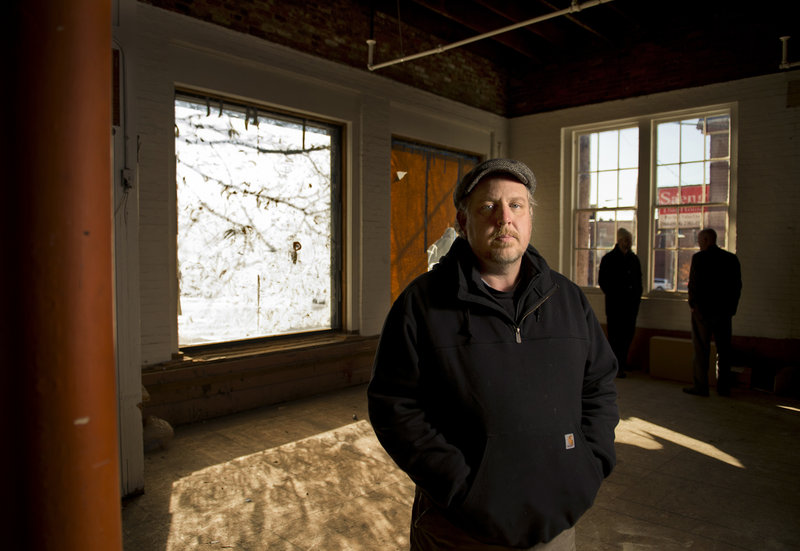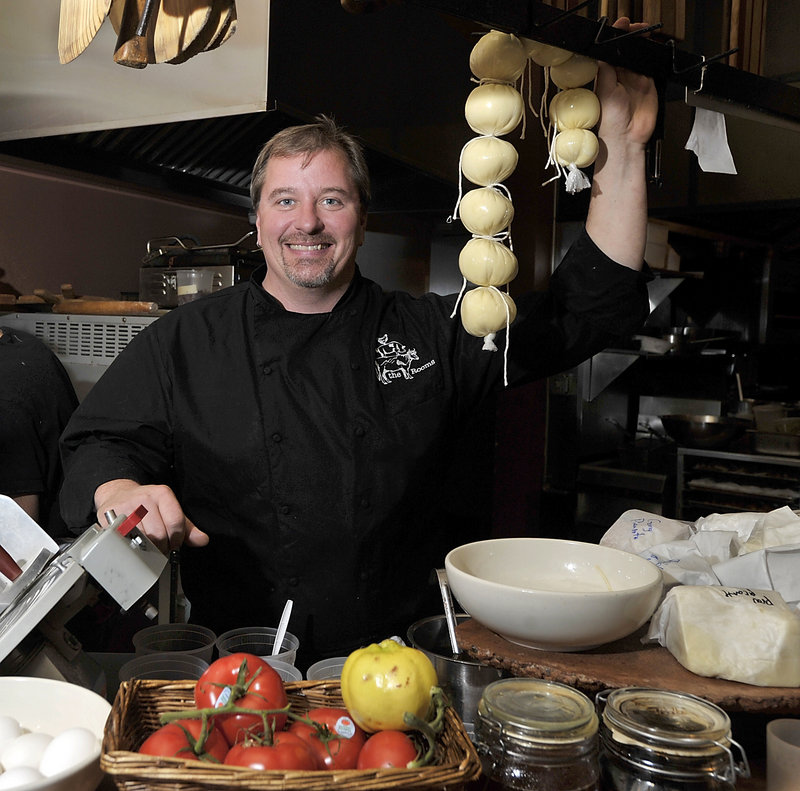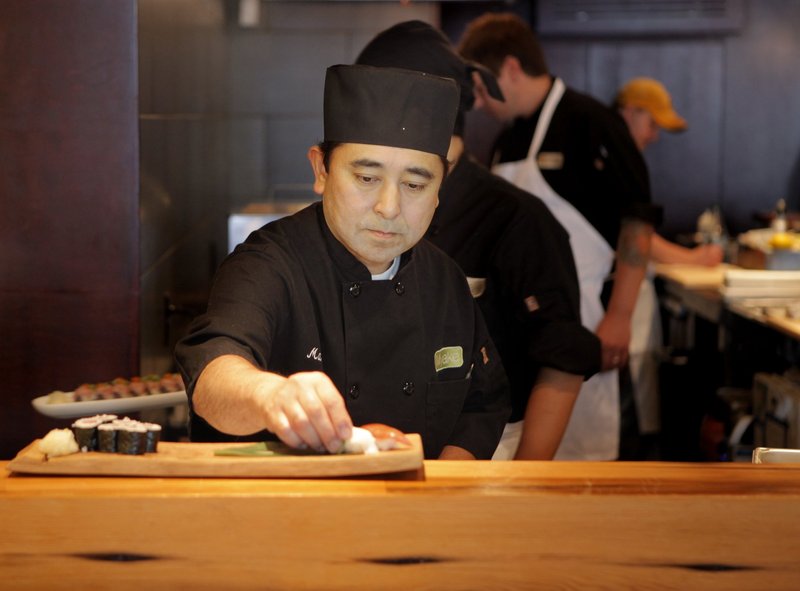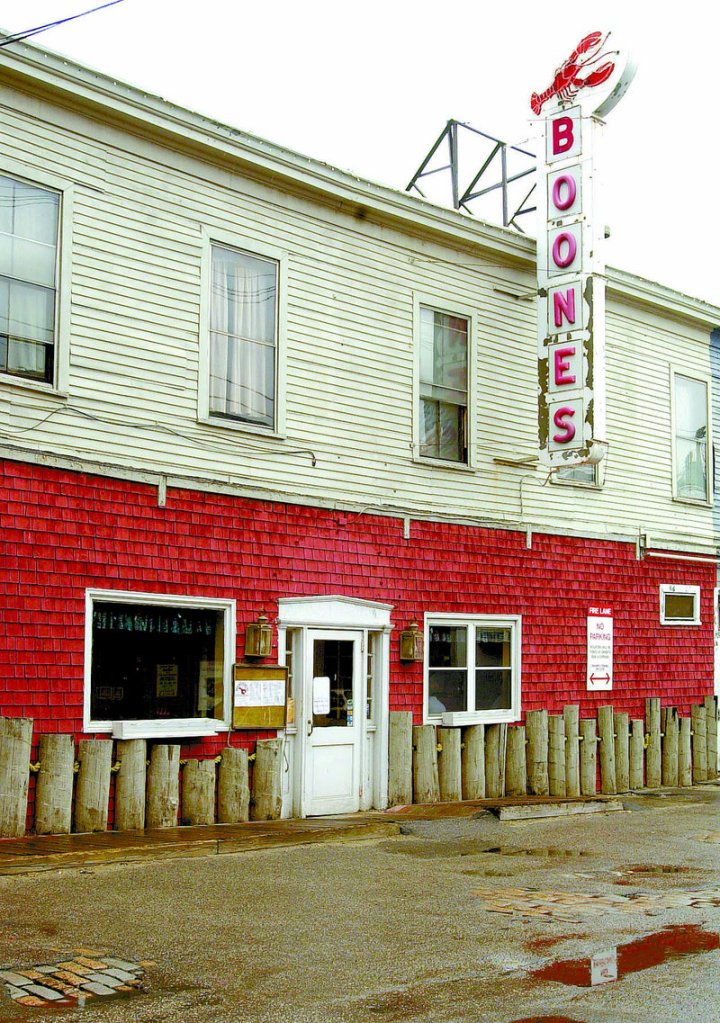PORTLAND – For months, rumors have swirled that chef Harding Lee Smith is going to open a new seafood restaurant on the waterfront, but little was known about the concept — or why Smith is taking the gamble of opening a fourth “Room” on the Portland peninsula.
In a recent interview, Smith confirmed that his new restaurant will be located at 6 Custom House Wharf, the former location of Boone’s Restaurant and Harbour’s Edge, the banquet hall that was recently caught in the same net as the Porthole by the city’s restaurant inspector. Smith has taken over the space and is transforming it into a full-service, mid-scale seafood restaurant with outdoor dining, an oyster bar on the second floor and a fireplace to keep things cozy for the locals in winter.
“The lobsters will be steamed over seaweed rather than just boiled, kind of like you would see along the coast on your way to Bar Harbor,” Smith said. “You see those places with the wood fire burning outside, and they have the lobsters cooking for people. I’m trying to bring that experience into Portland, without it being just a shack.”
Smith is just one of several established restaurateurs in the city who have recently announced they are opening up a third, or in his case, fourth restaurant on the Portland peninsula.
Jay Villani, owner of Local 188 and Sonny’s, announced in his most recent newsletter that he and his partners are opening a new barbecue joint called Salvage BBQ and Smoke House at 919 Congress St., the former home of Portland Architectural Salvage.
Last week, word leaked that chef Masa Miyake and his business partner, William Garfield, plan to re-open Food Factory Miyake on Spring Street, much to the delight of the tiny eatery’s adoring fans. That will bring Miyake’s restaurant count to three.
David Turin just opened his third place (his second in Portland), David’s Opus 10, right inside David’s Restaurant in Monument Square.
Will these well-known chefs be spreading themselves too thin? Can the city support more restaurants at a time when it already seems saturated with food choices and the competition is fiercer than it’s ever been?
RICHARD GROTTON, president of the Maine Restaurant Association, says he thinks there may still be some room in the Portland market for more restaurants, but opening a new place before the economy recovers may be “a big gamble.”
Portland diners have less cash on hand and pickier palates than ever. Established restaurateurs have an edge because they already have a big fan base, Grotton said, but if the food in their new restaurant disappoints, it won’t matter who they are.
“Everybody’s going to be interested in the new place, and that’s a huge advantage,” Grotton said. “But you’d better live up to your reputation.”
Jay Villani says he gets that.
“I do not take for granted people walking through the door, and I try to stress that to my staff,” he said. “Once we start taking for granted that people are coming in, we’re doomed.”
Villani’s Local 188 has been a success, but he says he wouldn’t open a restaurant like it again unless it was in another town. His barbecue place, opening next spring, will have “a completely different vibe.”
“If we were to do another Local someplace in Portland,” he said, “now that would be a big mistake.”
Villani says he gets his kicks these days being the “executive producer” of a restaurant. A former sculptor, he likes trying to create energy and flow in a space. “I’m really into this part — building them out, the flow — the whole project from beginning to end,” he said. “At this point in my life, that really excites me.”
Villani and the other restaurateurs planning new businesses say that today it’s essential to have a niche to fill in the city. Villani thinks there’s room here for more barbecue, and his new place will be just a block and a half from the ballpark at Hadlock Field.
The barbecue will be sold by the pound and be served with a vinegar-based sauce and lots of Maine craft beer.
“We’re making a trip down to Charlotte in a couple of weeks, a handful of us, and we’re going to do a little low-country tour of barbecue,” Villani said. “We’re going to take a little road trip and eat our way through some small holes and dives. I know I want it to be a Carolina-based barbecue. I’m not looking for a full-on Texas type of thing.”
WILLIAM GARFIELD says the new Miyake restaurant at 129 Spring St., expected to open no later than early spring, will serve “Japanese comfort food. ” The menu has not been decided yet, but it will once again be a BYOB establishment. (Since it closed in 2011, the tiny building has been used for catering and office space.)
The restaurant group already owns Miyake, a fine dining restaurant that started in the Spring Street location before it moved to 468 Fore St. last year, and Pai men Miyake, which has a more casual atmosphere and caters to fans of noodles and beer.
Garfield warns that people who loved the previous Food Factory Miyake should not expect the new incarnation to be a carbon copy of the old place.
“If we were just another sushi restaurant, I don’t think Portland would be able to support that, even with our BYOB fans,” Garfield said. “But we’re going to try to carve out another niche in that space — something that Portland has not seen before, but with a Japanese orientation around it.”
Expect some changes at Miyake as well. Garfield says the chef has “some new energy” for the Fore Street location and will likely debut a new menu there within the next few months.
Garfield says there’s always a risk with opening a new restaurant in Portland. “There have been quite a few that have opened up and not made it through the past 12 months,” he said, “so it’s definitely a concern of ours.”
Grotton says the competition in Portland is such that restaurateurs have to stay on their toes. They can’t be busy just on Friday and Saturday nights. Add another good restaurant to the mix, and it’s likely that a place that has been struggling probably won’t survive.
The stakes are a lot higher now, too. Villani says things have changed a lot in Portland since he opened Local 188 in 1999 in Longfellow Square. “It was scary then, spending what I spent, but it wasn’t that much,” he said. “It was under 20 grand when I opened up the old Local. I went downtown, and I gave them plans on a napkin, and they issued me a permit.”
Villani estimates it would cost at least $200,000 to open a restaurant in Portland today. Harding Lee Smith agrees with that figure, noting that now the city requires that restaurant plans be drawn by a design professional.
PEOPLE WHO HAVE LIVED in Portland for more than a decade or so know that Dana Street, the force behind Street and Company, Fore Street and many other food-related ventures, was the city’s first restaurateur to more than dabble in fine dining after the revival of the Old Port in the 1980s.
But in recent years, Harding Lee Smith is the name that pops to mind when it comes to ownership of multiple restaurants. His “Rooms” — The Front Room on Munjoy Hill and The Grill Room and The Corner Room Italian Kitchen and Bar on Exchange Street — are popular and successful enough that he hasn’t needed any outside investors to fund the fourth restaurant. (The new place will also have “Room” in the name, but Smith says he’s not ready to divulge that yet.)
“Everybody thinks I’m crazy,” Smith said. “You have to be crazy to be in the restaurant business. You have to love it, first of all. You have to love the business, you have to love food. You have to really care about it. There are plenty of places that open that think opening a restaurant’s a great idea, but they don’t really have any idea what it takes to operate them.”
Grotton says he is “very excited” about Smith’s new concept, but confesses: “If he can do it four times, I will bow and kiss the ring.”
Smith’s new space on Custom House Wharf has a long history as a restaurant. Boone’s was a Portland landmark that first opened as a lobster house in 1898. It’s said that Alexander Boone was one of the first chefs in the country to serve baked stuffed lobster.
Smith says he is “very confident” of his concept for the new restaurant because he’s followed the same thought process he did with his other businesses — look for a niche to fill, and offer good food at reasonable prices, making up for the smaller profit margins through higher volume.
Smith hopes to open the seafood place by mid-April or early May, but he’s got a lot of work to do first. He’s putting in a new kitchen, floors and walls, and dividing up the cavernous rooms into smaller dining areas. Last week, he traveled up to Farmington to snap up some handmade red oak chairs at an auction.
Smith is sharing the cost of shoring up the pilings underneath the restaurant with the landlord, Custom House Wharf Properties, but is still going back and forth with the Portland Water District about the timing and cost of improving the water pressure for the building’s sprinkler system.
“What it entails, unless you come up with another solution,” he said, “is cutting up the street from Commercial Street down and putting in 200 feet of an 8-inch water main, replacing a water main that was installed in 1892 and has not been bored out or replaced since then.”
Learning how to deal with these types of issues when starting his first three restaurants has been a big help in opening a fourth, Smith said.
“Knowing what is required from the city as far as the inspections go, the timeline it takes to get the inspectors there, letting those people do their jobs and understanding how their jobs work so you can work with them, that was a huge advantage,” he said. “Going into Boston, I would be lost. You don’t know who the players are in City Hall that you want to talk to, who can steer you in the right direction, who can make things go smoother.”
GROTTON SAID restaurateurs like Smith have several advantages over newcomers, on top of their reputations. They have a good knowledge of how the local restaurant industry works, and of the community and what people here will go for on a menu. The biggest advantage, he said, is their understanding of the business model.
“They have all sorts of data, so they know what labor’s going to cost,” Grotton said. “They know what utilities should run. And they can do financial projections that are really meaningful to a lender to help them get the money they need if they don’t have it themselves.”
Villani says it’s important to go in with conservative projections, “very moderate” expectations and the willingness to change direction, if need be, in midstream. “You’ve got to be flexible to roll with a punch, and there are plenty of punches in the restaurant business,” he said. “It’s not a golden road, that’s for sure. It’s a tough one.”
If all of these new restaurants from established chefs do well, what does that mean for the young chef who dreams of owning his or her own place? Will they be squeezed out of the market?
Garfield says he thinks there’s always room for a new restaurant in Portland as long as a chef has an idea that’s different and it’s expedited well.
Smith said he thinks new restaurants from established owners will raise the bar for newcomers. First timers won’t be able to just open a place with paper plates, dirty bathrooms and unswept floors, and expect to stay open.
“There will always be diversity,” Villani said. “Somebody hot and new is going to come along. Restaurants aren’t infinite, they’re finite.”
And that’s OK with him.
“You know, I don’t want to go eat at my joints all the time,” he said. “I like going out to eat. The more, the merrier. It’s exciting.”
Staff Writer Meredith Goad can be contacted at 791-6332 or at:
mgoad@pressherald.com
Twitter: MeredithGoad
Send questions/comments to the editors.







Success. Please wait for the page to reload. If the page does not reload within 5 seconds, please refresh the page.
Enter your email and password to access comments.
Hi, to comment on stories you must . This profile is in addition to your subscription and website login.
Already have a commenting profile? .
Invalid username/password.
Please check your email to confirm and complete your registration.
Only subscribers are eligible to post comments. Please subscribe or login first for digital access. Here’s why.
Use the form below to reset your password. When you've submitted your account email, we will send an email with a reset code.